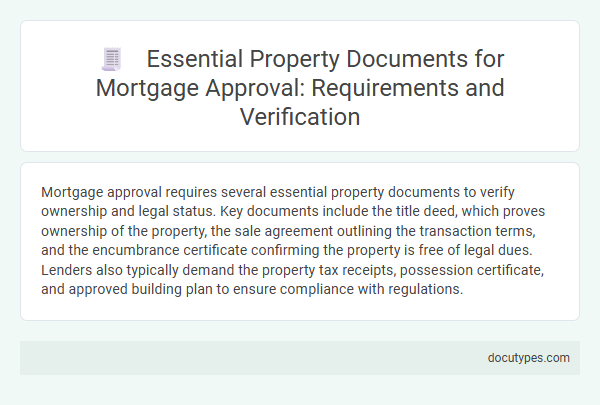Mortgage approval requires several essential property documents to verify ownership and legal status. Key documents include the title deed, which proves ownership of the property, the sale agreement outlining the transaction terms, and the encumbrance certificate confirming the property is free of legal dues. Lenders also typically demand the property tax receipts, possession certificate, and approved building plan to ensure compliance with regulations.
Introduction to Mortgage Property Document Requirements
Introduction to Mortgage Property Document Requirements |
|
|---|---|
| Property Title Deed | Legal document proving ownership of the property. Essential for verifying seller's rights during mortgage approval. |
| Sale Agreement | Contract between buyer and seller outlining terms and conditions of the property sale. Required to confirm transaction details. |
| Encumbrance Certificate | Certificate verifying the property is free from monetary and legal liabilities. Ensures clear ownership transfer. |
| Property Tax Receipts | Proof of payment for property taxes. Demonstrates property is not under any tax-related disputes. |
| Approval from Local Authorities | Documents showing that the property construction has municipal approvals. Validates compliance with building laws and regulations. |
| Occupancy Certificate | Certificate confirming the property is fit for occupation. Essential for new constructions during mortgage processing. |
| Identity and Address Proof | Applicant's legal documents to verify identity and residence. Necessary for loan sanctioning and official records. |
Key Property Documents Needed for Mortgage Approval
Key property documents required for mortgage approval include the title deed, which proves legal ownership of the property, and the sale agreement outlining the terms of the transaction. A property tax receipt confirms that all dues are paid, ensuring no tax liabilities hinder the mortgage process. Additionally, a no-objection certificate (NOC) from relevant authorities verifies that the property is free from legal disputes and encumbrances.
Title Deed: Proof of Property Ownership
The title deed is a crucial document in the mortgage approval process, serving as official proof of property ownership. Lenders require this to verify the borrower's legal rights to the property.
A clear and undisputed title deed ensures the mortgage can be legally secured against the property. Any discrepancies or liens noted on the title deed can delay or jeopardize mortgage approval.
Sale and Purchase Agreement Verification
Sale and Purchase Agreement (SPA) verification is a crucial step in mortgage approval as it confirms the legal transaction between buyer and seller. The SPA outlines the agreed price, payment terms, and property details, ensuring both parties are bound by the contract. Verifying this document helps lenders assess the legitimacy of the purchase and the borrower's commitment, facilitating a smooth mortgage process.
Building Approval and Occupancy Certificates
Building Approval and Occupancy Certificates are essential property documents for mortgage approval. These certificates verify that the property meets legal and safety standards required by lenders.
- Building Approval - Official permission from local authorities confirming the construction plans comply with zoning and building regulations.
- Occupancy Certificate - A document issued post-construction indicating the property is safe and suitable for habitation.
- Mortgage Requirement - Lenders require these certificates to ensure the property is legally constructed and safe before approving a mortgage.
Encumbrance Certificate: Ensuring Clear Title
The Encumbrance Certificate (EC) is a crucial document required for mortgage approval, as it verifies that the property is free from legal liabilities or claims. This certificate ensures that the title is clear and the property can be legally mortgaged without any disputes.
Issued by the local sub-registrar's office, the EC details all transactions related to the property over a specific period, highlighting any mortgages, liens, or other encumbrances. Banks and financial institutions rely heavily on this document to assess the property's legal standing before sanctioning a loan. Obtaining a clean Encumbrance Certificate provides confidence in the property's clear ownership and financial eligibility for mortgage processing.
Latest Property Tax Receipts
Latest property tax receipts are essential documents for mortgage approval as they confirm the property's tax compliance and ownership status. Lenders use these receipts to verify the property's legal standing and ensure there are no outstanding dues that could affect the loan process.
- Proof of Tax Payment - Latest property tax receipts serve as evidence that the property taxes have been paid up to date.
- Verification of Property Ownership - These receipts help confirm the rightful ownership of the property linked to the mortgage application.
- Assessment of Property Value - Property tax receipts reflect the assessed value used by authorities, aiding lenders in evaluating the collateral's worth.
Approved Building Plan and Completion Certificate
What types of property documents are required for mortgage approval? An approved building plan is essential to verify that the construction adheres to local regulations and zoning laws. The completion certificate confirms that the property construction is finished and meets safety standards.
No Objection Certificate (NOC) from Relevant Authorities
No Objection Certificate (NOC) from relevant authorities is a critical document required for mortgage approval. It certifies that the property complies with local regulations and has no pending legal issues.
The NOC ensures that the property is free from encumbrances and clear for transfer. Lenders require this document to mitigate risks and confirm the legitimacy of the property title before sanctioning a loan.
What Types of Property Documents Are Required for Mortgage Approval? Infographic

